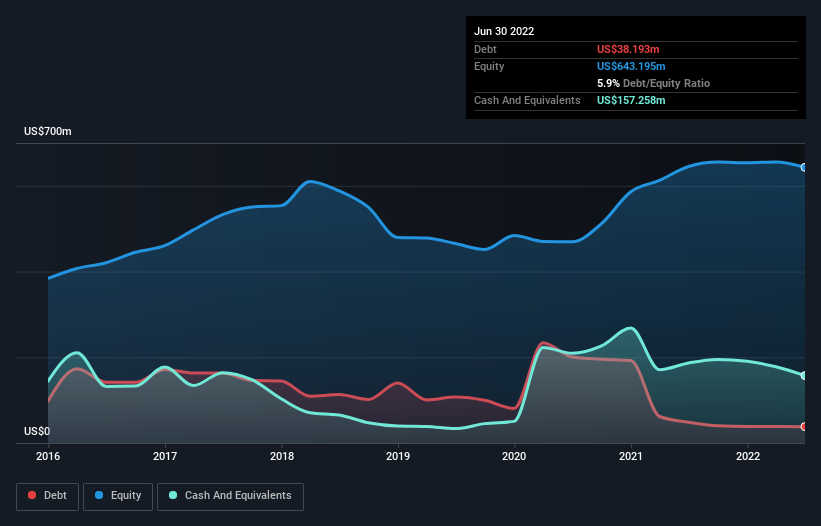
The external fund manager backed by Berkshire Hathaway's Charlie Munger, Li Lu, makes no bones about it when he says 'The biggest investment risk is not the volatility of prices, but whether you will suffer a permanent loss of capital.' So it might be obvious that you need to consider debt, when you think about how risky any given stock is, because too much debt can sink a company. We note that Gentherm Incorporated (NASDAQ:THRM) does have debt on its balance sheet. But the real question is whether this debt is making the company risky.
Why Does Debt Bring Risk?
Debt is a tool to help businesses grow, but if a business is incapable of paying off its lenders, then it exists at their mercy. If things get really bad, the lenders can take control of the business. While that is not too common, we often do see indebted companies permanently diluting shareholders because lenders force them to raise capital at a distressed price. Of course, the upside of debt is that it often represents cheap capital, especially when it replaces dilution in a company with the ability to reinvest at high rates of return. When we think about a company's use of debt, we first look at cash and debt together.
Our analysis indicates that THRM is potentially overvalued!
How Much Debt Does Gentherm Carry?
The image below, which you can click on for greater detail, shows that Gentherm had debt of US$38.2m at the end of June 2022, a reduction from US$48.3m over a year. But on the other hand it also has US$157.3m in cash, leading to a US$119.1m net cash position.

How Strong Is Gentherm's Balance Sheet?
Zooming in on the latest balance sheet data, we can see that Gentherm had liabilities of US$239.2m due within 12 months and liabilities of US$64.6m due beyond that. Offsetting these obligations, it had cash of US$157.3m as well as receivables valued at US$237.5m due within 12 months. So it actually has US$90.9m more liquid assets than total liabilities.
This short term liquidity is a sign that Gentherm could probably pay off its debt with ease, as its balance sheet is far from stretched. Simply put, the fact that Gentherm has more cash than debt is arguably a good indication that it can manage its debt safely.
The modesty of its debt load may become crucial for Gentherm if management cannot prevent a repeat of the 58% cut to EBIT over the last year. Falling earnings (if the trend continues) could eventually make even modest debt quite risky. When analysing debt levels, the balance sheet is the obvious place to start. But it is future earnings, more than anything, that will determine Gentherm's ability to maintain a healthy balance sheet going forward. So if you want to see what the professionals think, you might find this free report on analyst profit forecasts to be interesting.
But our final consideration is also important, because a company cannot pay debt with paper profits; it needs cold hard cash. Gentherm may have net cash on the balance sheet, but it is still interesting to look at how well the business converts its earnings before interest and tax (EBIT) to free cash flow, because that will influence both its need for, and its capacity to manage debt. Over the last three years, Gentherm recorded free cash flow worth a fulsome 82% of its EBIT, which is stronger than we'd usually expect. That positions it well to pay down debt if desirable to do so.
Summing Up
While it is always sensible to investigate a company's debt, in this case Gentherm has US$119.1m in net cash and a decent-looking balance sheet. The cherry on top was that in converted 82% of that EBIT to free cash flow, bringing in US$19m. So we are not troubled with Gentherm's debt use. There's no doubt that we learn most about debt from the balance sheet. But ultimately, every company can contain risks that exist outside of the balance sheet. For example, we've discovered 2 warning signs for Gentherm that you should be aware of before investing here.
At the end of the day, it's often better to focus on companies that are free from net debt. You can access our special list of such companies (all with a track record of profit growth). It's free.
New: Manage All Your Stock Portfolios in One Place
We've created the ultimate portfolio companion for stock investors, and it's free.
• Connect an unlimited number of Portfolios and see your total in one currency
• Be alerted to new Warning Signs or Risks via email or mobile
• Track the Fair Value of your stocks
Have feedback on this article? Concerned about the content? Get in touch with us directly. Alternatively, email editorial-team (at) simplywallst.com.
This article by Simply Wall St is general in nature. We provide commentary based on historical data and analyst forecasts only using an unbiased methodology and our articles are not intended to be financial advice. It does not constitute a recommendation to buy or sell any stock, and does not take account of your objectives, or your financial situation. We aim to bring you long-term focused analysis driven by fundamental data. Note that our analysis may not factor in the latest price-sensitive company announcements or qualitative material. Simply Wall St has no position in any stocks mentioned.
About NasdaqGS:THRM
Gentherm
Designs, develops, manufactures, and sells thermal management and pneumatic comfort technologies in the United States and internationally.
Undervalued with excellent balance sheet.
Similar Companies
Market Insights
Community Narratives



